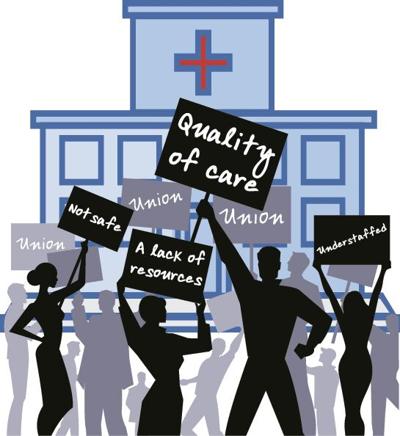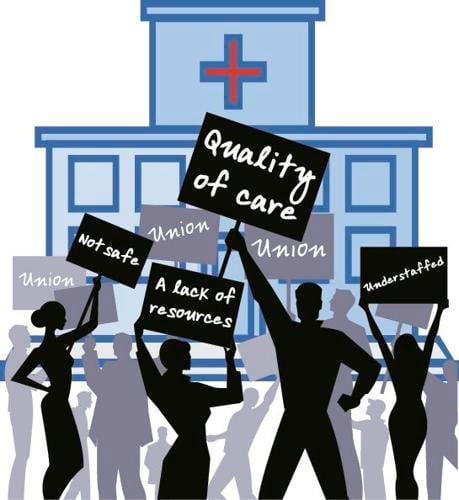CONCORD — Nurses at Concord Hospital are exploring a potential union bid, citing concerns regarding unsafe staffing ratios and patient safety as primary motivators.
In order to trigger a union election and garner legal protections from the National Labor Relations Board, 30% of the Concord campus’ 600-675 registered nurses have to sign cards indicating their willingness to participate in unionization efforts.
Meanwhile, hospital administrators have gone to great lengths to discourage the union bid, hiring consultants to hold informational sessions in order to dissuade nurses from signing the cards.
Working conditions at the hospital
On Wednesday, three veteran nurses — Peggy Smith, Archie Chase and Joanne Jones, who’ve been assigned pseudonyms to protect them from retaliation — said they love their work and Concord Hospital at large, but are worried about conditions there and hope to see major operational changes.
At the offices of the SEA/SEIU Local 1984, groups of experienced nurses at Concord Hospital gathered with union employees to discuss strategy and work toward their ultimate goal of gaining collective bargaining power and legal protection.
Nurses came to the union — not the other way around — in mid-summer 2024: June or July, to the best of their recollection. They sought advice on how to move forward in lobbying for collective bargaining power.
Motivated by fears of an unsafe working environment, characterized by chronic lack of staff and over-employment of inexperienced nurses, they described their experiences leading up to initial unionization efforts. Notably absent from their list of concerns: pay.
“The seat at the table, to be able to bring our concerns and have them heard,” Jones said.
“It was a combination of things, watching our coworkers leave over and over again, hiring in less-experienced people coming in to fill their spots,” Smith said.
“You no longer have an experienced, cohesive crew. Now it’s a hodgepodge of people with very minimal experience and [we’re] feeling very unsafe. Because not only have we been asked to do more with less, but the people that are filling the holes don’t have enough experience, really, to work to the same level as the people that left.”
Toward the end of the chaos caused by COVID-19, staffing levels weren't returning to their pre-pandemic levels, the nurses said. Ratios of nurses to patients should generally be in the neighborhood of 1:4, but now they’re frequently seeing higher ratios, which can contribute to longer hospital stays for patients and increased costs for all parties.
“Any time a nurse is given more than four patients, the mortality rate for each additional patient goes up by 16%,” Smith said. “Imagine if you’re patient No. 6 or 7. There’s just a lot that you miss.”
“The length of stays has also been linked to staffing levels,” Jones said.
“It’s been borne out in the research that length-of-stays can be brought down by improved staffing.”
Following the pandemic, nurses banded together and did what they could to ensure success and the safety of patients, Chase said.
“Four years ago, there was an emergent situation with the pandemic. We did what we had to do to cover staffing and our patients and everything,” Chase said.
“We worked short, but we made it work, because we did what we had to do to keep ourselves safe.”
At some point, hospital leaders may have realized they could do more with less, which was better for business.
“In that time, I feel like management figured out that we could do it — they never bulked back our staffing after that,” Chase said.
“They knew that we could do it, so this is what they expect of us now.”
Issues with staffing, generally the nurses’ primary concern, result in strange problems, including their inability to take lunch breaks. Clocking out for lunch is required, but not reasonably possible most days, they said. In order to ensure safe staffing and adequate patient care on the floor, they generally work through lunch. Then, on yearly performance reviews, they’re often docked merit pay increases, having been docked for regularly not taking a lunch break.
“Lunch is like a unicorn to most floor nurses: it just doesn’t happen,” Smith said.
“Either bring your lunch, or you might be able to step away and grab lunch and then you eat it close to your patient rooms while you chart. Hopefully, you can just chart and eat and not be interrupted.”
And the same issue is poorly resolved by the practice of floating nurses between sections of the hospital. This method can cause another set of issues, though, because not all nurses are trained, qualified or comfortable with working in areas with which they are unfamiliar. Nurses who work in the emergency department, for example, may not have experience working with newborns or other specialized units.
At times when the patient census is higher, these conditions result in patients waiting, sometimes for extended periods of time, in hallway beds and even a few closets, the nurses explained.
Initial exploration & union cards
After bringing their concerns to the union and working toward the eventual dissemination of cards to be signed last summer, hospital leadership became aware of burgeoning unionization efforts. On Nov. 14, 2024, Chief Operating Officer Mary Bakken and Vice President of Nursing Professional Practice and Education Erin Collins penned a letter to hospital-based RNs, encouraging them to consider options other than unionization. One such letter, sent to RNs at the Franklin and Laconia campuses, was obtained by The Laconia Daily Sun.
“I was very nervous,” Chase said regarding their initial decision to seek advice from the union. “I knew some kind of change was necessary, but I had to kind of get a feel for it, see if it was a good idea or not.”
Smith, Chase and Jones said similar letters were received by staff in Concord, and soon thereafter, consultants from The Crossroads Group — a firm specializing in speaking with employees when unionization efforts are afoot — came to the hospital, offering non-mandatory meetings and slide presentations the nurses said were intended to dissuade them from signing union cards. It was toward the end of November when cards were first disseminated to RNs.
The Crossroads Group, commonly referred to as an “anti-union” consultant, charged $450 per hour, plus expenses, for their services at Dartmouth-Hitchcock when similar union activity was underway, according to an NHPR report last year. Concord Hospital leadership declined to answer when asked how much the group was paid to conduct the meetings on the Concord campus last year.
Rich Gulla, president of SEIU 1984, said it's not unusual for companies to bring in outside labor consultants when unionization may be imminent.
“This is common, they’re willing to spend millions of dollars in order to dissuade their employees from organizing,” Gulla said.
“Sometimes lines are crossed.”
Consultant Miko Penn of Crossroads apparently worked in tandem with another consultant at the Concord campus, conducting meetings during the day, while another consultant held open discussions with nurses at night.
Nurses said they were not forced or coerced into attending the meetings, but hospital leaders brought in other employees, including those from the “float pool”, in order to make time for shift nurses to attend. Some floors printed out schedules, indicating times when those employees could attend the meetings. Those consultants stayed in Concord for about a week, leaving by the end of November, but have reportedly since held similar meetings in the Lakes Region.
Representatives from Crossroads did not return a request for information.
Looking to the future
The nurses of Concord Hospital still have quite the hill to climb in order to reach their 30% threshold and trigger an election, but these nurses felt confident they’d achieve that goal. They’re hopeful they’ll be able to gain a seat at the table, so to speak, obtain greater bargaining power and, ultimately, improve the level of care they are able to provide.
“It’s just hard to go to work,” Smith said.
“People want to go in and take really good care of their patients — that’s what a nurse wants, and it’s hard to do. It’s not uncommon to leave feeling very defeated.
“I’ve heard people say if this doesn’t go through, they’re getting another job,” she continued.
“There’s a lot of people who would really like to be able to sit down at the table, be treated as an equal and be able to have some input and have a voice.”
When asked if these particular nurses would feel comfortable having their friends and family admitted to Concord Hospital for care, they responded with a disappointed “no”.
“Sadly, no,” Smith said. “There’s so many great nurses and physicians and great staff all around at the hospital, but we’re not given adequate tools to really provide the best patient care. I would have concerns.
"We’re here because we do love this hospital. We love our community, we love our coworkers and the physicians we work with and the ancillary staff. But this isn’t sustainable — we can’t keep functioning this way.”
“We have people who want to have jobs, we just need to incentivize them coming to Concord, we need to figure out how to get them in,” Chase said.
“The idea of us unionizing might provide an incentive for people to come work at Concord, as well.”
Gulla said he’s hopeful the nurses will find success in their endeavor.
“It’s truly a win-win situation,” Gulla said.
“Hopefully they’ll be successful.
“That’ll be a big deal, if that happens.”
Hospital leadership did not respond to questions regarding concerns expressed by these nurses. Chief Advancement Officer Veronica Rosa sent this statement by email:
“At Concord Hospital Health System we value our employees, their input, and their feedback. We believe that through open dialogue and collaboration, we can continue to make progress and grow as an organization. We respect the right of every nurse to have a choice about unionization, however, we believe the best way forward is through a shared nursing governance model and our current working relationship that provides the best environment for the teamwork and flexibility that is essential to nursing. We are committed to working together to build upon our culture of caring and providing exceptional care to our patients and communities.”



















(1) comment
Great way to drive up the cost of healthcare
Welcome to the discussion.
Log In
Keep it Clean. Please avoid obscene, vulgar, lewd, racist or sexually-oriented language.
PLEASE TURN OFF YOUR CAPS LOCK.
Don't Threaten. Threats of harming another person will not be tolerated.
Be Truthful. Don't knowingly lie about anyone or anything.
Be Nice. No racism, sexism or any sort of -ism that is degrading to another person.
Be Proactive. Use the 'Report' link on each comment to let us know of abusive posts.
Share with Us. We'd love to hear eyewitness accounts, the history behind an article.